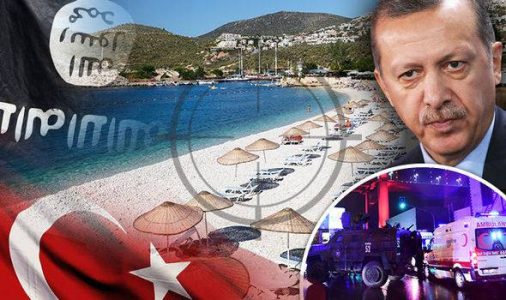
Turkey is becoming a heaven for terrorist financing
New U.S. sanctions on Islamic State (ISIS) operatives based in Turkey have brought questions about Ankara’s counterterrorism priorities and raised the prospect that the country could face crippling economic sanctions of its own, experts have warned.
Turkish counterterrorism units detained Ismail Bayaltun in July 2015, several weeks after 48 tons of aluminum pigment owned by his export import company were barred from exiting Turkey into Syria.
The aluminum pigment, a raw paint material, is legally available on the market, but Turkey’s National Intelligence Agency (MİT) reportedly flagged the large shipment, informing the Ministry of Customs and Trade that it could also be used to make explosives.
Four years later, on Nov. 18, the U.S. Treasury added Ismail and his brother Ahmet Bayaltun, who was also implicated in the aluminum pigment shipment, to the U.S.’s Specially Designated Nationals list for their roles as procurement agents for ISIS.
The Bayaltuns join a growing number of individuals and companies operating in Turkey on the U.S. counterterrorism sanctions list, raising questions about Turkey’s counterterrorism policy.
“U.S. Treasury designations against ISIS, Hamas and other terrorist organizations increasingly point to Turkey as a haven for illicit activities, including illicit finance,” Jonathan Schanzer, the senior vice president for research at the Foundation for Defense of Democracies and a former terrorism finance analyst at the U.S. Treasury, told Ahval.
Special Designation places sanctions on individuals and companies with links to terrorism that freeze any of their U.S.-based assets and make it illegal for any U.S. entity to do business with them.
The export-import business ACL Ithalat Ihracat, which is owned by Ismail, Ahmet, and their brother Mustafa Bayaltun, was also added to the Special Designations list on Nov. 18. ACL’s main offices are located in Turkey’s Şanlıurfa province, a short drive north of the Syrian border town Tel Abyad, where packages with the Bayaltun name were found when Kurdish forces liberated the town from ISIS in 2015.
The brothers’ social media accounts show that the Şanlıurfa provincial chairman of President Recep Tayyip Erdoğan’s governing Justice and Development Party (AKP), Bayattin Yildiz, has visited Mustafa Bayaltun at ACL’s offices at least twice this year, most recently on Nov. 16.
The U.S. Treasury says Ahmet Bayaltun was identified as an ISIS procurement agent in early 2017 and that the brothers’ “company supplied ISIS with equipment in 2015 and 2017.” Mustafa Bayaltun was not added to the U.S. counterterrorism sanctions list.
Although two years is a fair amount of time for the U.S. Treasury to build a terrorism finance case, Peter Harrell, a sanctions expert at the Center for New American Security, told Ahval it was not entirely surprising given the high volume of sanctions pursued by the current administration.
“This administration is designating more people per year than any other administration across a range of sanctions programs,” he said, “but it is not hiring that much more staff. There is a real bandwidth issue.”
But the fact that Turkish authorities knew the Bayaltuns and their company were suspected of attempting to provide bomb-making materials to ISIS in 2015 raises questions about why they were left free and able to continue supplying ISIS in 2017.
“This points to a highly selective counterterrorism policy on the part of the Erdoğan government,” Schanzer said. “It fully prosecutes certain terrorist groups, while wielding political or financial influence with others.”
In addition to the Bayaltuns, numerous other individuals and financial exchange entities operating in Turkey have been implicated by the U.S. Treasury in the financing of ISIS and other terrorist organizations.
In 2019 alone, the United States has announced new Turkey-based additions to the counterterrorism sanctions list in April, targeting the Rawi Network that manages ISIS’s financial affairs, and in September targeting a broad set of terrorism financiers in Turkey and elsewhere.
Sanctions on the Bayaltuns alone may not be a major issue for Turkey, but the broader range of U.S. sanctions programmes are a concern for Ankara.
Washington has been mulling measures against Turkey for a long list of disputes, including its purchase of Russian-built S-400 missile systems and its military operation against U.S.-backed Kurdish-led forces in northern Syria last month.
“Turkey likely sees more meaningful sanctions down the road due to the increasingly fractured U.S.-Turkey relations,” Harrell said. Therefore, “it makes sense for Ankara to pursue ways to reduce its dependence on the United States for trade and finance.”
Schanzer thinks that increasing U.S. sanctions “could prompt Turkey to look for new currencies and systems to circumvent U.S. controls. Russia and China, not to mention crypto-currencies, are natural alternatives.”
In October, Turkey signed an agreement with Russia to create a new bilateral financial infrastructure and increase the use of their national currencies for international transactions, thereby circumventing the need to use the dollar.
Harrell said that a fairly rapid shift away from dependence on the U.S.-led international financial system would be possible in the medium term, but that in the short term, U.S. sanctions would significantly impact the Turkish economy.
“Turkey already had a warning about the impact of U.S. sanctions,” he said. “With the sanctions imposed during the Brunson affair last year, Turkey saw a rapid depreciation in the lira. It saw that sudden, unexpected sanction moves can rattle the Turkish economy.”
Despite the efforts of some countries to create mechanisms for evading U.S. sanctions, Schanzer said, “Turkey will likely find that it has little choice but to work within the U.S.-led system.”
“The question now,” he said, “is will it come to this realization the hard way? Or will it begin to take its illicit finance problems more seriously?”
Source: Ahval News





